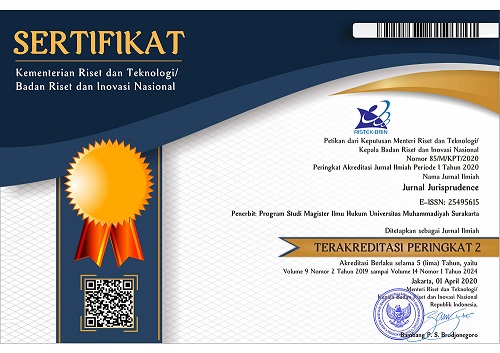Civil War in South Sudan: Conflict Resolution through Mediation by the African Union
DOI:
https://doi.org/10.23917/jurisprudence.v14i1.4224Keywords:
Civil War, Intergovernmental Authority on Development, Sudan, Otoritas Antar Pemerintah untuk Pembangunan, Perang SaudaraAbstract
ABSTRACT
Purpose of the study: This article discussed the historical scope of the Civil War in Sudan and outlined the causes of the Sudanese civil war conflict, which has not been resolved despite mediation efforts.
Methodology: The article provided the information objectively by conducting a literature review from reliable sources, such as national and international publications, and subdividing the content into comprehensive categories.
Results: This article shows that the cause of the Civil War in Sudan was political complications and ethnic tensions, which caused each side to attack the other. The tensions that arise make it difficult to resolve conflicts due to the lack of commitment from each party to carry out the obligations that have been agreed upon as a result of mediation. Finally The ICC court decision number ICC-02/05-01/20-391 Decision on the designation of a Single Judge of Pre-Trial Chamber I was one step ahead on the processing the war crimes perpetrator
Applications of this study: This research offers a thorough examination of the origins, progression, and settlement of violence in South Sudan. This analysis of the accomplishments and failures of the African Union’s mediation efforts in the South Sudan conflict can aid researchers and policymakers in better understanding this conflict and creating more practical measures for its resolution. List the various causes of war in South Sudan, including discrimination, economic disparity, and ethnic divisions. Using this knowledge, ways to deal with these issues and avert further conflict can be developed. The African Union’s mediation efforts in South Sudan’s conflicts are examined in this paper. By using this material, more people will be aware of the potential contributions regional organizations can make to the process of conflict resolution.
Novelty/ Originality of this study: This research is the first to offer a thorough examination of the dynamics, causes, and settlement of violence in South Sudan. It had hitherto only addressed one facet of this conflict. It will examine the achievements and shortcomings of the African Union’s efforts to mediate the South Sudanese conflict. This analysis is significant because it can teach unites political, economic, and social ideas. It helps conflict mediators understand how regional groups might resolve issues. Courts may see the African Union's South Sudanese Civil War mediation differently. They'll likely see African Union mediation as a method to promote peace. Courts support international law-based mediation that involves all parties since South Sudan is independent and can decide its own future. Courts prioritize a peace settlement that addresses all sides' concerns, including civic society and the poor. They emphasize rigorous enforcement and execution procedures to support any solution, as well as international participation to maintain peace and stability in South Sudan. By using this knowledge, regional organizations can play a more effective role in other international disputes. Because of its uniqueness and novelty, this study can significantly advance our knowledge of the South Sudanese war and the ways in which regional organizations resolve disputes.
Keywords: Civil War, Intergovernmental Authority on Development, Sudan
ABSTRAK
Tujuan: Artikel ini akan membahas ruang lingkup sejarah perang saudara di Sudan dan artikel tersebut akan menguraikan penyebab konflik perang saudara Sudan yang belum terselesaikan meskipun ada upaya mediasi.
Metodologi: Artikel menyajikan informasi secara objektif dengan melakukan tinjauan literatur dari sumber yang kredibel seperti jurnal nasional dan internasional dan diuraikan menjadi informasi yang komprehensif.
Temuan: Artikel ini menunjukkan bahwa penyebab perang saudara di Sudan adalah komplikasi politik, dan ketegangan etnis yang menyebabkan masing-masing pihak saling menyerang. Ketegangan yang muncul mengakibatkan sulitnya penyelesaian konflik karena kurangnya komitmen dari masing-masing pihak untuk menjalankan kewajiban yang telah disepakati sebagai hasil mediasi. Selain itu juga terdapat putusan Pengadilan Kriminal Internasional dengan nomor ICC-02/05-01/20-391 yang memutuskan bahwa perkara kejahatan terhadap kemanusiaan akan di proses dengan hakim tunggal dan ini adalah sebuah langkah maju
Kegunaan: Artikel ini menawarkan pemeriksaan menyeluruh tentang asal usul, perkembangan, dan penyelesaian kekerasan di Sudan Selatan. Analisis mengenai pencapaian dan kegagalan upaya mediasi Uni Afrika dalam konflik Sudan Selatan dapat membantu para peneliti dan pembuat kebijakan dalam memahami konflik ini dengan lebih baik dan menciptakan langkah-langkah yang lebih praktis untuk penyelesaiannya. Sebutkan berbagai penyebab perang di Sudan Selatan, termasuk diskriminasi, kesenjangan ekonomi, dan perpecahan etnis. Dengan menggunakan pengetahuan ini, cara-cara untuk mengatasi masalah-masalah ini dan mencegah konflik lebih lanjut dapat dikembangkan. Upaya mediasi Uni Afrika dalam konflik Sudan Selatan dibahas dalam makalah ini. Dengan menggunakan materi ini, lebih banyak orang akan menyadari potensi kontribusi yang dapat diberikan oleh organisasi-organisasi regional dalam proses penyelesaian konflik.
Kebaruan/Orisinalitas: Artikel ini merupakan penelitian pertama yang menawarkan kajian menyeluruh terhadap dinamika, penyebab, dan penyelesaian kekerasan di Sudan Selatan. Sampai saat ini, pendekatan ini hanya membahas satu aspek dari konflik ini. Konferensi ini akan mengkaji pencapaian dan kekurangan upaya Uni Afrika untuk memediasi konflik Sudan Selatan. Analisis ini penting karena dapat memberikan wawasan berharga kepada mediator konflik lainnya. Penelitian ini menggunakan metodologi interdisipliner yang mengintegrasikan beberapa sudut pandang, termasuk sudut pandang politik, ekonomi, dan sosial, untuk meningkatkan pemahaman tentang potensi kontribusi organisasi regional dalam penyelesaian perselisihan. Dengan menggunakan pengetahuan ini, organisasi regional dapat memainkan peran yang lebih efektif dalam perselisihan internasional lainnya. Karena keunikan dan kebaruannya, penelitian ini dapat meningkatkan pengetahuan kita secara signifikan mengenai perang Sudan Selatan dan cara-cara organisasi regional menyelesaikan perselisihan.
Kata Kunci: Otoritas Antar Pemerintah untuk Pembangunan; Perang Saudara; Sudan
Downloads
Submitted
Accepted
Published
Issue
Section
License
Copyright (c) 2024 Jurnal Jurisprudence

This work is licensed under a Creative Commons Attribution 4.0 International License.

















